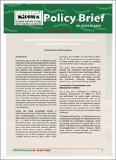| dc.date.accessioned | 2020-11-25T06:29:38Z | |
| dc.date.available | 2020-11-25T06:29:38Z | |
| dc.date.issued | 2019 | |
| dc.identifier.uri | http://repository.kippra.or.ke/handle/123456789/2243 | |
| dc.description.abstract | Institutions play a key role in determining the economic growth and development of a country. Institutions are important in maintaining the rule of law, promoting development programmes and activities and protecting property rights for individuals and businesses. There has been concerted efforts by the Government of Kenya to formalize the informal sector due to the potential of the sector in improving the competitiveness of a country in the global economy. The sector has continued to grow and constituting 83.4 per cent of total employment. According to the 2018 Economic Survey, the informal sector created 787,800 jobs out of the total 897,800 jobs in 2018, meaning it was the highest contributor of new jobs. To address the challenges related with informality, the Government and private sector have come up with institutions, policies, regulations and laws to coordinate, harmonize, manage and promote the development of the informal sector... | en |
| dc.language.iso | en | en |
| dc.publisher | The Kenya Institute for Public Policy Research and Analysis (KIPPRA) | en |
| dc.relation.ispartofseries | PB/92/2019-2020 | |
| dc.subject | Institutional Structures | en |
| dc.subject | Governing | en |
| dc.subject | Informal Sector | en |
| dc.subject | Micro and Small Enterprises | en |
| dc.subject | Kenya | en |
| dc.title | Policy Brief No. 92 of 2019-2020 on Assessment of Institutional Structure Governing the Informal Sector in Kenya | en |
| dc.type | KIPPRA Publications | en |
| ppr.contributor.author | Mwami Mary and Matwere Mercy | en |

